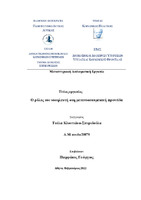| dc.contributor.advisor | Πιερράκος, Γεώργιος | |
| dc.contributor.author | Τσέλα, Κλοντιάνα-Σπυριδούλα | |
| dc.date.accessioned | 2022-03-30T06:40:44Z | |
| dc.date.available | 2022-03-30T06:40:44Z | |
| dc.date.issued | 2022-02 | |
| dc.identifier.uri | https://polynoe.lib.uniwa.gr/xmlui/handle/11400/2017 | |
| dc.identifier.uri | http://dx.doi.org/10.26265/polynoe-1868 | |
| dc.description.abstract | Θεμελιώδη αρχή της ΠΦΥ είναι η θεώρηση της υγείας ως κοινωνικό δικαίωμα, βάση της οποίας προκύπτει ότι είναι βασική υποχρέωση του κράτους να παρέχει ενιαία και συνεχή κάλυψη των αναγκών περί της υγείας των πολιτών, χωρίς διακρίσεις λόγω κοινωνικών, οικονομικών, θρησκευτικών ή φυλετικών διαφορών. Στόχος μέσω της ΠΦΥ είναι η καταπολέμηση των ανισοτήτων σε θέματα υγείας, η οριζόντια και ορθά οργανωμένες υπηρεσίες υγείας όπου με τη συμμετοχή της κοινότητας θα λαμβάνονται αποφάσεις σχετικές με την υγεία. Στόχος των συστημάτων υγείας όλων των αναπτυγμένων χωρών είναι η παροχή υψηλής ποιότητας υπηρεσιών υγείας, για να μπορούν να ανταποκρίνονται στις συνεχώς αυξανόμενες ανάγκες και προσδοκίες των χρηστών – πολιτών τους. Η μετανοσοκομειακή ιατρική συνδέεται με την μακροχρόνια φροντίδα υγείας. Η Μετανοσοκομειακή περίθαλψη, αποτελεί συνέχεια της ιατρικής φροντίδας και έχει σε επαφή τον ασθενή με το ιατρικό σύστημα, ενώ παράλληλα δίνει ευελιξία στην αξιολόγηση και τη διαχείριση των συμπτωμάτων της ασθένειας, ενώ παρέχει την απαραίτητη ψυχοκοινωνική στήριξη που απαιτείται στον ασθενή. Πολλοί ασθενείς, μετά από νοσηλεία από ασθένεια ή από τραυματισμό, χρειάζονται να τους παρέχεται συνεχή ιατρική φροντίδα, είτε σε εξειδικευμένη εγκατάσταση, είτε στο σπίτι. Η μετα-οξεία φροντίδα αφορά ένα σύνολο από υπηρεσίες ιατρικής περίθαλψης που σχετίζονται με την ανάρρωση του ατόμου από την ασθένεια αλλά και την διαχείριση της χρόνιας ασθένειας ή της αναπηρίας. Όσο αφορά την μετανοσοκομειακή φροντίδα στην Ελλάδα, παρατηρούμε ο ρόλος των
φροντιστών υγείας έχει μεν αναγνωριστεί αλλά υπάρχουν ακόμα ελλείψεις ως προς την υποστήριξή τους, την κατάρτισή τους και τους παρέχεται ελλείπεις ενημέρωση για τις δυνατότητες που παρέχονται από διάφορες υπηρεσίες στήριξης, ενώ υπάρχουν σημαντικά προβλήματα ενημέρωσης και πρόσβασης και του πληθυσμού στη λήψη των υπηρεσιών αυτών. Χρειάζεται μια αναδιοργάνωση, νέα στοχοθεσία, κεντρικός σχεδιασμός υποστηριζόμενος από αποκεντρωμένες δομές όπου με την κατάλληλη στρατηγική θα υλοποιηθεί ένα πρόγραμμα μετανοσοκομειακής φροντίδας, σύμφωνα με το όραμα της ποιοτικής ολιστικής φροντίδας. | el |
| dc.format.extent | 137 | el |
| dc.language.iso | el | el |
| dc.publisher | Πανεπιστήμιο Δυτικής Αττικής | el |
| dc.rights | Αναφορά Δημιουργού - Μη Εμπορική Χρήση - Παρόμοια Διανομή 4.0 Διεθνές | * |
| dc.rights | Attribution-NonCommercial-NoDerivatives 4.0 Διεθνές | * |
| dc.rights.uri | http://creativecommons.org/licenses/by-nc-nd/4.0/ | * |
| dc.subject | Μετανοσοκομειακή φροντίδα | el |
| dc.subject | Μετα-οξεία φροντίδα | el |
| dc.subject | Μακροχρόνια φροντίδα | el |
| dc.subject | Κοινοτικοί νοσηλευτές | el |
| dc.subject | Ανακουφιστική φροντίδα | el |
| dc.title | Ο ρόλος του νοσηλευτή στη μετανοσοκομειακή φροντίδα | el |
| dc.title.alternative | The role of the nurse in post-hospital care | el |
| dc.type | Μεταπτυχιακή διπλωματική εργασία | el |
| dc.contributor.committee | Σούλης, Σωτήριος | |
| dc.contributor.committee | Γούλα, Ασπασία | |
| dc.contributor.faculty | Σχολή Διοικητικών, Οικονομικών & Κοινωνικών Επιστημών | el |
| dc.contributor.department | Τμήμα Διοίκησης Επιχειρήσεων | el |
| dc.contributor.master | Διοίκηση και Διαχείριση Υπηρεσιών Υγείας και Κοινωνικής Φροντίδας | el |
| dc.description.abstracttranslated | A fundamental principle of PHC is the view of health as a social right, based on which it appears that it is a basic obligation of the state to provide uniform and continuous coverage of citizens' health needs, without discrimination due to social, economic, religious or racial differences. The goal through the PHC is the fight against health inequalities, the horizontally and properly organized health services where with the participation of the community will be made decisions related to health. The goal of the health systems of all developed countries is to provide high quality health services, so that they can meet th e ever-increasing needs and expectations of their users - citizens. Post-hospital medicine is linked to long-term health care. Post-hospital care refers to a wide range of services, which includes either the management of existing symptoms or the monitoring of a patient who
has been discharged from the hospital, for a period or for the rest of his life. Outpatient care is a continuation of medical care and has the patient in contact with the medical system, while giving flexibility in the evaluation and management of the symptoms of the disease, while providing the necessary psychosocial support required of the patient. Many patients, after hospitalization due to illness or injury, need to be provided with ongoing medical care, either in a specialized facility or at home. Post-acute care refers to a set of medical care services related to the recovery of the person from the disease but also the management of the chronic disease or disability. Regarding post-hospital care in Greece, we note that the role of health care providers has been recognized but there are still shortcomings in terms of their support, training and lack of information about the possibilities provided by various support services, while there are significant information problems. and access and the population to receive these services.
We need a reorganization, new goal setting, central planning supported by decentralized structures where with the appropriate strategy a post-hospital care program will be implemented, according to the vision of quality holistic care. | el |


